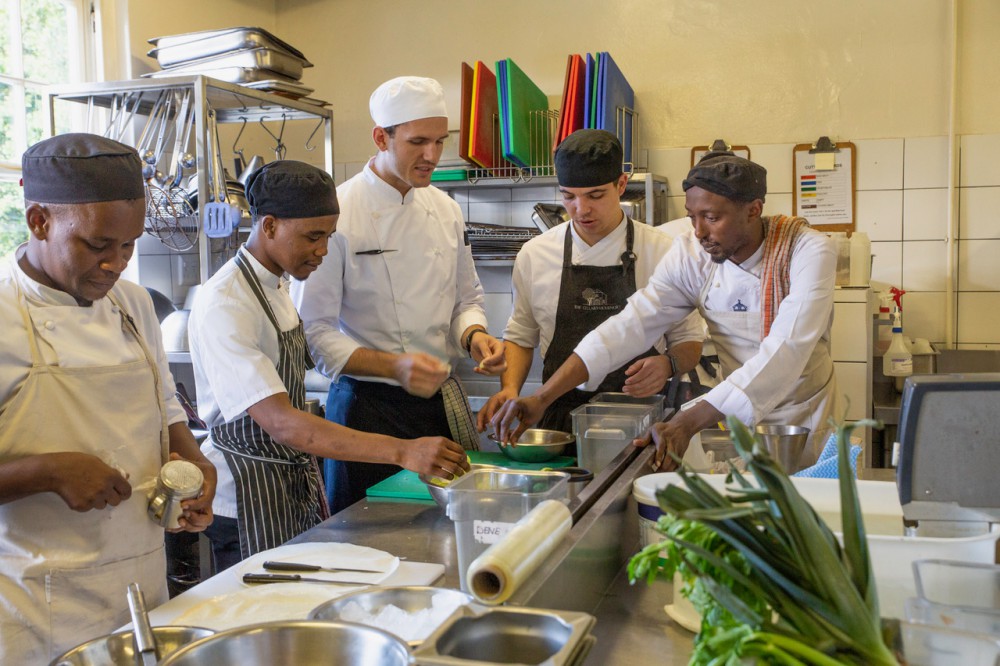Jobs
22 Lessons You Learn While Working in a Restaurant

Students or young adults often work restaurant jobs to support themselves financially before finding careers in different industries. These positions provide a great starting point for people’s careers, as there are many transferable skills and lessons you can learn while working in a restaurant. Working a restaurant job can help prepare you for future positions by learning and developing skills such as patience, multitasking and teamwork.
In this article, we discuss what is involved in working in a restaurant as well as 22 common transferable skills you might learn while working in a restaurant.
What is involved in working in a restaurant?
Working in a restaurant typically involves serving customers and preparing food and drinks in a fast-paced environment. Depending on the role, restaurant workers may be responsible for taking orders, delivering food and beverages to customers, preparing and cooking meals, managing inventory and supplies, cleaning and sanitizing work areas and handling cash and other forms of payment. For those who have a passion for food and hospitality, working in a restaurant can be a great career choice.
22 transferable skills you learn working in a restaurant
Transferable skills are abilities that you develop in one role that you can then use in many different types of roles in various industries and levels. Here are 22 transferable skills you might learn while working in a restaurant:
1. Teamwork
In a restaurant, each position relies on the others. For example, a server relies on cooks and bartenders to be timely and accurate with orders and hosts and hostesses to seat customers evenly so they can give each table timely attention. When applying to future positions after working at a restaurant job, consider mentioning that you’re already familiar with team dynamics and how to handle different personalities in a fast-paced environment.
2. Multitasking
Restaurants are often busy, so multitasking is essential to meet customers’ needs. For example, you may help serve one customer while delivering the check to another. This skill can help prepare you for fast-paced environments in the future and may make you more marketable for those types of positions.
3. Patience
Multiple orders, customers’ attitudes and differing coworker personalities require patience to overcome. Methods of patience, such as breathing techniques and keeping positive thoughts, can help you maintain a sense of calm in stressful environments.
4. Customer service
Restaurant jobs, like being a server or host, allow you to constantly improve your customer service skills because you’re always interacting with patrons. Good tips are usually dependent on practicing good customer service skills, such as patience, diplomacy and maturity. Customer service skills can help you interact with customers or clients in any career you pursue.
5. Communication
Effective communication is essential to any workplace and is especially necessary in a restaurant environment. Whether it’s talking with customers or your peers, good communication promotes trust, collaboration and overall satisfaction for guests and employees alike. One way you can improve your communication in a restaurant role is if you have questions or concerns, convey those to the proper person, and in return, they may better understand they can bring their questions or concerns to you, too. You can apply this in other workplaces as well.
6. Prioritization
While multitasking, it’s important to determine which tasks are more important than others. Employees stay busy while working in a restaurant, and to handle tasks efficiently, prioritization is essential. Orders are important to keep track of chronologically, but urgent requests from peers or management may supersede what you’re already working on. Setting boundaries, delegating tasks and limiting distractions are all prioritization skills that are helpful anywhere.
7. Punctuality
Working a restaurant job can help you realize the importance of punctuality, as showing up on time keeps a busy restaurant running smoothly. For instance, if you work during a busy shift, it may be important to be on time to ensure all customers can receive tables. If you have worked well in a restaurant job, you may be more likely to be a dependable and punctual person, two qualities that many employers value in candidates.
8. Managing conflict
Because you frequently interact with customers and peers in a fast-paced, high-pressure environment when working a restaurant job, you’re likely to experience conflict at some point. Learning how to properly manage conflict can prepare you for leadership roles later in your career. Related skills and virtues such as listening, positivity, assurance and empathy are helpful for conflict resolution and management in all roles.
9. Professionalism
Disgruntled customers and disagreements among peers can be common at restaurants, but keeping composure and remaining professional can help ease these issues. Not only does professionalism help to secure tips, but it also helps a restaurant maintain its reputation. Taking pride in the company you work for and setting a great example of representing your company to customers or clients can help you be an asset to your employer at any point in your career.
10. Presentation
Restaurant managers often require their employees to wear uniforms or adhere to a dress code. They also expect you to show up to work prepared and hygienic, which can help you build habits that you may use in any future positions. Your presentation also maintains a company’s positive reputation.
11. Workplace cleanliness
A clean restaurant prioritizes health and safety. Working in a restaurant can help you realize the importance of workplace cleanliness. In an office setting, this can help a business maintain professionalism, better welcome customers, clients and employees and allow you and your team members to focus better.
12. Honesty
If you make a mistake, it’s important to be honest and admit to it as soon as possible. In a restaurant setting, you may write down an order incorrectly or seat a customer in the wrong section. When these things happen, being upfront and honest with customers or peers can better alleviate issues. People often appreciate honesty and may like your candor. Being honest also creates a trustworthy and team-friendly environment.
13. Math skills
Basic mathematics is essential when working in a restaurant setting. When calculating tips or adding ingredients that cost extra money, you become familiar with basic mathematics in a real-life setting. If you have worked well in a restaurant setting, try highlighting this skill on your resume or next job interview for an accounting, finance, bookkeeping or administrative role, among others that use numeracy.
14. Resilience
Learning how to persevere through challenges and still perform your duties with professionalism can help you thrive in any setting. In interviews for various roles, they may ask you to describe a challenge you’ve had to overcome. Examples of resilience, like those from your days working in a restaurant, can provide excellent answers to such questions.
15. Adaptability
A restaurant environment changes on a day-to-day basis and often features regular staff turnover. Being able to adapt to new customers and coworkers can allow you to succeed quickly when you change fields or try something new. If you have restaurant experience on your resume, an employer might see you as a person who is flexible, independent and doesn’t require micromanaging to accomplish tasks.
16. Work ethic
Work ethic is the mindset of determination and dedication to doing your best at work. You often develop a great work ethic as a restaurant employee by doing your best to meet customers’ needs, helping out your teammates, and keeping the restaurant clean and high-functioning. You can then use this work ethic in your future roles, showing the same dedication to doing the best you can for your employer and team.
17. Respect
Practicing respect involves treating customers and your peers in a friendly and empathetic manner. A cohesive environment demands respect at all levels, no matter where on the hierarchy of positions someone lies. A good work environment is one where people confront disrespect and embrace respect. Restaurants are a great place to practice respect and see how it can help develop strong relationships.
18. Managing stress
Due to their fast-paced nature, restaurant jobs might allow you to practice proper stress management that you can rely on later in life. Techniques such as taking breaks when needed, mindfulness and discussing issues and problems with coworkers who can relate to your situation are all helpful ways to cope with stress.
19. Confronting failure
Simple mistakes such as forgetting a customer’s drink or relaying the wrong order to a bartender allow you to confront failure and handle it. Though you may experience failures or make mistakes such as these while working a restaurant job, you can use these situations as learning opportunities. Note how you reacted to these scenarios and what you can copy or change for the future.
20. Memorization
The longer you work at a restaurant job, often the better you are at memorizing details. With practice and experience, handling large requests from customers becomes much easier. Memorizing details and acting promptly on requests assures managers that you can get your tasks done without help or hesitation.
21. Confidence
One benefit of having face-to-face interaction on a daily basis is building confidence in your communication and public speaking skills. You may find the confidence you didn’t know you had by interacting with customers. Giving advice on what to order or delegating tasks to different coworkers can help you build confidence in your work that you can use throughout your career.
22. Leadership
Many employees working in a restaurant may work in management roles or lead a set of other team members. As a leader in a restaurant, you can motivate and inspire your team members to work together toward a common goal, such as improving customer service or decreasing wait times. Leadership in a restaurant also helps you train and develop your team members. This skill helps you identify the strengths and weaknesses of each employee and provide them with the most effective training and development opportunities.

22 Lessons You Learn While Working in a Restaurant
